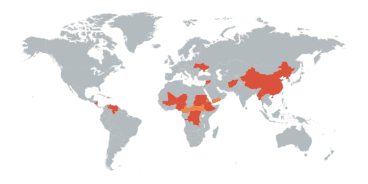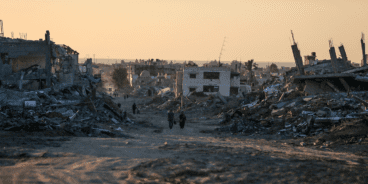
We Are Scared for Our Lives’: On the Brink of Failure in the Central African Republic
The following article, written by Evan Cinq-Mars and Naomi Kikoler was originally published in the Huffington Post. The original version is available here.
“We are scared for our lives,” a government official told us. You could feel and see his fear, his hands shook as he explained the grisly scene of a judge being lynched and mutilated in public by a mob of civilians. His own house was under threat of attack and he feared for his family.
The deadly violence that has gripped CAR since December 2012 has spared no one. Government officials are targeted and killed, often in broad daylight and without sanction. Christians were predominantly the targets of vicious attacks by the Seleka, the rebel group that overthrew the government in March 2013. Now the country’s Muslim minority is the primary target of the predatory Christian and animist ‘anti-balaka’ militias that were originally formed as local self-defense groups.
The United Nations estimates at least eighty percent of CAR’s Muslim population has been forced to flee or has been killed since December 2013. Most of the country’s remaining Muslims now shelter in besieged areas, living in perpetual fear of attack by the anti-balaka. To leave without protection even within a few metres could mean a death sentence at the hands of vicious killers.
Standing between the killers and their potential victims are African Union peacekeepers and a French stabilization force. We were told repeatedly that these forces have prevented ‘Srebrenica style massacres’. Yet they are overwhelmed and unable to adequately protect vulnerable populations in the Texas-sized country.
Presently, there is a tragic but necessary focus on evacuating and relocating those Muslims that wish to leave to safer parts of CAR – or out of the country entirely. But evacuation under military escort is still no guarantee of safety. A convoy of nearly 1300 Muslims leaving the PK12 neighborhood of Bangui was recently attacked by anti-balaka fighters north of the capital leaving 2 people killed and 6 wounded.
Twenty years after the Rwandan genocide the international community is once again at the precipice of another historic failure to protect a population from preventable atrocities. Our actions in the coming weeks and months will dictate whether twenty years from now we will be commemorating our failure to uphold ‘Never Again’ not just in Rwanda, but also in CAR.
The UN has a critical role to play in ensuring that history does not repeat itself. The UN Security Council authorized a 12,000-strong peacekeeping mission, MINUSCA, which will incorporate AU forces and additional troops and police. Providing physical protection is undoubtedly the key priority in CAR and creation of the mission was essential. But expectations for the peacekeepers must be realistic. There is currently no peace to keep, armed groups are proliferating and most potential peacekeepers have not been trained for the type of violence they will be confronted with.
But perhaps the biggest challenge is that the UN mission will only be operational in six months. Between now and then the entire Muslim community may flee or be relocated, permanently changing the social fabric of the country.
What can be done to protect civilians in the interim?
The French, AU and incoming European Union troops and police will have a critical role to play. This will include protecting civilians during relocation, in addition to enhancing protection for those who chose to stay. But troops alone will not end the crisis in the CAR. Upholding the Responsibility to Protect populations from mass atrocities, a commitment every government made in 2005, requires a multi-faceted response.
In Bangui, the country’s capital, numerous officials told us what is needed alongside more troops is an end to impunity. No one has been held accountable for atrocities that have already been perpetrated. Horrific attacks are often carried out in public, with the gruesome deeds captured on camera or cellphone.
The UN, AU and international donors must invest in rebuilding the broken justice sector. Every effort must be made to arrest, charge and prosecute perpetrators of atrocities. This will be dangerous work and international forces must protect the lives of officials involved.
Now is also the time for mediation and reconciliation. Christians and Muslims still live side-by-side with each other in parts of the country, despite the communal violence that has pitted them against one another. Support must be given to local conflict-dispute resolution mechanisms, including the deployment of international mediators to help preserve what remains of CAR’s diverse social fabric. Similarly, messages of peace and tolerance should be conveyed on a regular basis from domestic political and religious leaders, as well as international actors.
When asked what was needed to solve the crisis, the resounding answer from people in Bangui was a UN peacekeeping operation. But the people of CAR cannot wait six months for the UN to arrive. As the official we spoke to said, “We need permanent protection.” That protection needs to come not just from existing international forces, but also by holding perpetrators accountable, supporting mediation and fostering reconciliation today.
Failure to do so will only result in more lives lost and, for the survivors, seemingly empty apologies from the international community for failing to do enough twenty years later.
Related Content


